Q&A Interview w/ OUTLANDER Sam Heughan, Caitriona Balfe T. Menzies, R.Rankin, S. Skelton + EPs
Maj Canton - July 29, 2017
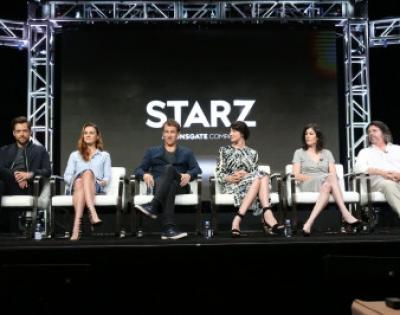
Yesterday at the Television Critics Association (TCA) Summer Press Tour, Starz presented an OUTLANDER press panel that included series stars Richard Rankin, Sophie Skelton, Tobias Menzies, Caitriona Balfe, Sam Heughan (via satellite from Budapest) and Executive Producers Maril Davis and Ronald D. Moore. Answering journalists' questions, they dished about Claire and Jamie's parallel lives and time-tested love, Brianna and Roger's geeky-sexy relationship, and filming in South Africa. We edited the panel's proceedings for clarity and readability, and added photos from TCA and from Season 3.
What were the stars wearing at TCA? Well, I asked them. Before the panel started, Caitrona told me she was wearing a long black & white devoré fabric print dress by Marni. Ronald D. Moorel laughed when I asked him -- he was wearing khaki pants and a white button down shirt.
Season 3 of OUTLANDER premieres Sunday, September 10, 2017 at 8pm ET/PT on Starz and includes 13 episodes based upon "Voyager," the third of eight books in Diana Gabaldon's international best-selling Outlander series. The third season of OUTLANDER picks up right after Claire travels through the stones to return to her life in 1948. Now pregnant with Jamie's child, she struggles with the fallout of her sudden reappearance and its effect on her marriage to her first husband, Frank. Meanwhile, in the 18th century, Jamie suffers from the aftermath of his doomed last stand at the historic battle of Culloden, as well as the loss of Claire. As the years pass, Jamie and Claire attempt to make a life apart from one another, each haunted by the memory of their lost love. The budding possibility that Claire can return to Jamie in the past breathes new hope into Claire's heart...as well as new doubt. Separated by continents and centuries, Claire and Jamie must find their way back to each other. As always, adversity, mystery, and adventure await them on the path to reunion. And the question remains: When they find each other, will they be the same people who parted at the standing stones, all those years ago?
.
|
|
|
|
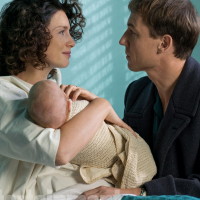 |
Question: The emotional weight is so heavy -- in a good way -- for a viewer in the first few episodes. Was that intentional or is that just where the story is organically going? Maril Davis: I'll start in saying it was just the journey of the characters. Obviously, Claire and Jamie have lost each other, and it's figuring out in this 20-year absence how they go on and how they move forward in the light of this great loss. Ronald D. Moore: It was just the nature of the book, so we sort of translated that to the story on the screen. You are traveling through 20 years of their lives apart, and that's a considerable amount of time to cover. So you tend to focus on the major moments of drama, the heaviest moments, and the most impactful moments as you move through that kind of chronology. |
|
|
|
|
 |
Question: Mr. Menzies, you've had some extraordinarily difficult scenes to play and one monologue particularly that seemed very unusual. Can you talk about approaching those scenes and the mind-set you were in? Did you have to shake it off or can you just go, "Okay. That's the scene," and cut? Tobias Menzies: You are talking about the Black Jack stuff where he talks about his sadism and his sort of relationship. Yeah, it's a weird head space to try to get into, but that's sort of what's interesting about acting, that you get to sort of explore and think and maybe say things and do things that you are not supposed to do in real life, which is good. And it's certainly why I like acting, why I get into it. So I really relish those opportunities exploring the kind of darker side of things. And, obviously, the opportunities for that in this show have been quite extensive. It's an exploration of a sadist, someone who is interested in other people's pain barriers. Yeah, that's interesting territory to explore. |
|
Question: Given that Mr. Menzies has had such a strong presence in the show, will we meet any other Randalls who look like him, or is he going away for good in Season 3? Ronald D. Moore: The Randall family tree is a very broad one. You never know. There's no plans for that. I mean, Tobias has been such a key part of the show from the very beginning. It's very difficult to imagine that he's not part of the family going forward. And you never say never. Who knows. There will be various flashbacks, and we do have a time-travel show. So the possibilities are there, but we don't really have anything on the boards at the moment. Maril Davis: Although we feel like he might come back as a female member of the Randall family. Sophie Skelton: I think that would be good, yeah. Tobias Menzies: That would be great. Caitriona Balfe: Daisy Randall. Tobias Menzies: Daisy Randall. Question: One of the scenes that people are looking forward to is the death of Black Jack Randall, but he and Jamie, despite being mortal enemies, do have sort of a relationship. Can you talk about how you approached that scene and sort of giving it the proper ending to these two finally ending their feud? Tobias Menzies: Yeah. It's a difficult storyline to tie up in a way. Where do you go after, especially the stuff towards the end of Season 1. So they meet on the battlefield of Culloden. It's sort of almost in flashback -- it's Jamie's hallucination as he remembers fragments of this encounter. So Jack is buried in there. It's a nonverbal tying up of the story. It's this strange kind of dance. And I think both as writers and as performers, we always try to look for an unusual angle. So it wasn't just a straightforward fight. There's something odder going on with them. I like the way it's come out. It's sort of a strange kind of part fight, part dance, part embrace, and I feel like a fitting end to this very peculiar kind of quasi love affair. |
|
|
|
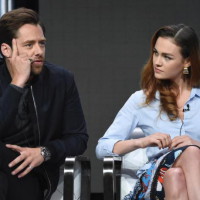 |
Question: Richard and Sophie, this show is very sexy. How does it feel to get cast in a series where merely appearing on it kind of makes you a sex symbol? Is that a lot of pressure? Sophie Skelton: We both read the books beforehand, so we kind of knew what was to come for those characters. And with Brianna and Roger, they have a very different type of relationship -- they are kind of geeky, and they have this sort of awkward stumble of a relationship. So I wouldn't massively say that they are the sexiest relationship going. Richard Rankin:Sophie says, "We are going to make you a sex symbol." |
|
Sophie Skelton: So he signed up straightaway. Richard Rankin: Sure, I'll do that. Sophie Skelton: No, but I think their relationship is very different. What's beautiful about Claire and Jamie is that they are both these really strong characters, and that strength and stubbornness kind of brings them together. Once they are together, you sort of see that love survive through time. And I think, with Roger and Bri, there's always this push and pull. They are just as stubborn -- but in a very different way -- and they kind of view each other as each other's punching bag, don't they? Richard Rankin: Yeah. I don't really recall if Roger and Bri are being romantic. It's not really an element that really strikes me too much of this show. It's not something I think about. I think, obviously, they are kind of a new romance on the show, a very definite one. Sophie Skelton: Sort of beautifully awkward. Richard Rankin: We've got a very strong romantic relationship, obviously, with Jamie and Claire, but I think it's just adding a new dynamic, a new kind of relationship but I don't know if, on the set, it was particularly sexually objectified. I've never felt that -- not yet anyway. I mean, who knows what's going to happen farther down the line. It's still to be written, but we'll see. Sophie Skelton: Yeah. I think it's still a deep relationship, but it's just that kind of beautiful awkwardness, isn't it, of a relationship? I think it is a very female fan base too, so if there needs to be a sex symbol, it's this one. I'm fine. Richard Rankin: I'm happy. I'll take one for the team, you know. |
|
|
|
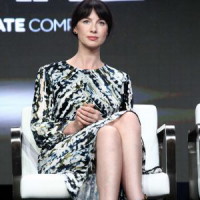 |
Question: It's a rare commodity when you find a project that appeals to both men and women on completely different levels and yet the same level. Is that why you were attracted to the parts and to the production in the first place? Caitriona Balfe: Well, one thing I think we've always said about our show is that the female character of Claire is sort of at the center, but it's not just her. It's the fully formed characters of Jamie and Frank as well and Black Jack, and what that gives you; whereas, on some shows, maybe you have this central male character and then surrounding him are more two-dimensional versions of women. We've made all of our characters fully formed, and they all have great depth, so what you get is a great balanced look at relationships. I think that that's why so many people relate to it and like to connect to it, because it's giving you a realized version of people. |
|
|
 |
Question: Did you all read the books prior to taking the parts? Tobias Menzies: You knew the books [speaking to another panelist] Maril Davis: I obviously read all of the books, but I was not cast in this. I would be curious if all of our actors read the books. Caitriona Balfe: I've read every book that we've filmed. So, Season 1, I read Book 1 before we filmed Season 1, the same with Season 2, the same with Season 3, and I'm currently halfway through Book 4 because we are about to start Season 4. So I like to have read it. It gives you an overview of where your character is going to go, but then, obviously, once we get into production, the scripts are your guidance. |
|
Tobias Menzies: I've read one and a half books. Sophie Skelton: We'll stop. I read the books when the first casting came through just because -- Caitriona Balfe: All of them? Sophie Skelton: Well, no. Sorry. Up to Book 4, just because I wanted to get a good sense of Bri. Brianna and Roger kind of slowly seep into the story. So you didn't have as much material to work with. But kind of what Caitriona said as well, you don't want to read too far because characters change, and you don't want to consciously interpret who they become, earlier on. So you want to get a sense of bits of their personality that seep in throughout the books, but you also don't want to play the character that they are further down the line too soon. Richard Rankin: Yeah, I've read up to "The Fiery Cross," which is Book 5, and much for the same reason, because we come in, obviously, at the end of Season 2, and we only really had that episode to base our characters on. So we only had one episode. And all of the material is great. There's not really an awful lot to go on, so I kind of read just to get myself an idea of Roger -- what the fans' perception of Roger was and what they were going to be expecting from the character. And although I think it's important to have an awareness of that, to have a kind of respect for that, I think it's also important that I bring myself to the part, that I find what's true in the part for me so that I can honestly portray that on-screen. So, yeah, I read ahead just to get kind of get a flavor of it, but I tend not to take too much from it. Ronald D. Moore: I'm waiting for the graphic novel. It's easier with pictures. [laughter] Question: Did any of you have any experiences where the season was coming up and you read the next book and you thought, "Oh, crap. I really did not see that coming"? Sam Heughan: Well, I think anyone who's read Diana's books will say, "Oh, crap. I never saw that coming," because it's just a sequence of twists and turns. I think that's the great thing about this series of books, and it's a great thing about our show. And I'm sure this is the reason why Ron and Maril were so hungry to make it, is that you're constantly being kept on your toes. I mean, who would have thought we would end up on ships and in Jamaica this season? You never know what to expect. And the great thing about it being a time-traveling fantasy is the story can go anywhere and very frequently does. And it just keeps it really interesting for all of us. |
|
|
|
.jpg) |
Question: Because you have this amazing source material, does it make it difficult when you realize that your romantic leads are going to have to be apart for 20 years? And then also about working in these two different worlds, is that fun or does it make more difficult? Ronald D. Moore: Well, as always, we take our cues from the book first, and the book laid out this certain episodic story of Jamie to begin with. You had, sort of, five chapters of his life from the Battle of Culloden to Lallybroch and then to the prison and then Hellwater and then ends up in the print shop. So, as we approached the season structurally, we laid out the cards on the board, and it was sort of clear that that's five episodes right there. And then it was, "All right. Well, if we are going to do that, we need to construct a parallel story for Claire. And what would that story be?" Well, the most interesting thing is probably her relationship with Frank and the dissolution of that marriage, her becoming a doctor, and raising Brianna. So then we sort of decided on that parallel structure for the first half of the season, and we never really varied from it. It felt like the right amount of time, and it felt like it was enough to build a want -- a desire in the audience to get Claire and Jamie back together so that they were really pushing for it and getting excited, but it wasn't dragging it out too long. And it's also two decades of these two people's lives. So it felt like, to do that justice, you had to give it some time and some space so you didn't just brush over it and pretend like nothing had really happened. |
|
Maril Davis: And also, from a production perspective, it was a little difficult just for the character of Claire alone. We saw her in the '40s, the '50s, and the '60s, and obviously, we don't shoot everything in linear manner, so there was a constant going back and forth of hairstyles and different costumes and makeup styles. Same with Jamie. He, as well, progressed in each of the episodes. So from that point of view, it was very difficult, that season. So I think it's nice to be in a place now when we're all in the same time zone, basically. Question: "Voyager" is the longest book, and I believe there was some consideration about splitting the season into two. I was wondering how far down on that road did you go, and then what in the end made you decide it should just be one season? Ronald D. Moore: We didn't go too far down that road. We did talk about that before we approached the season, because just in terms of page counts, it's like the biggest of the books, so you sort of automatically feel like maybe this is too much material for one season. But once we put the cards up on the board and you kind of quickly saw, well, there's five episodes right here just in the Jamie story and then the reunion of the two characters, well, now you're almost halfway through the season and that felt like about the right pace. And then you looked at the second half of the book, and with the sea voyage and the story in Jamaica and then ending up in the New World, when you really boiled it down to what the story was and the character relationships, we realized we could tell this in just one season and I don't think we were really tempted to sort of try to stretch it beyond that. Sometimes just sheer page count in the novel doesn't translate to pages on the screen, because there's digressions. There's description. There's other internal thoughts that Diana's playing in the books. And when you strip a lot of that away because of the nature of what you're doing in the TV show, you realize that, oh, actually it's this long, and so you just never know. I think each season we approach fresh, with fresh eyes, and we're not bound to do a season a book and we haven't said we're going to combine them or tear them apart, but we just always are sort of open to what's the best way of telling this particular year on the show. |
|
|
|
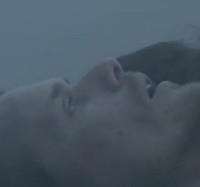 |
Question: Sam, in the first episode of new season, there's points where you have to do nothing but blink. I mean, you barely move, because you're almost dead. How hard is it to play scenes like that where you just don't do anything except suffer quietly? Sam Heughan: I think that's fair enough, yes. The first episode was something that we were all looking forward to shooting. The Battle of Culloden was something that not only the crew and the Highlanders and everyone was anticipating, but it's a real important part of our history. And so, yeah, I think it was a great start to the season. And certainly, Jamie does suffer it pretty horrendously. But Brendan, our director, was great and really worked through sort of the journey of Jamie there and his loss and coming to terms with having lost Claire and actually not expecting to survive the battle. And hello to everyone [on the panel] as well. [Laughter.] I miss you guys. Maril Davis: It's nice to see you’re down at the docks, Sam. |
|
|
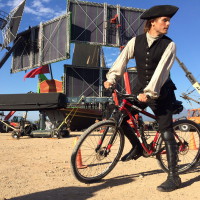 |
Question: You talked a little bit at Comic-Con about the experience of filming on the ships. Can you talk a little bit about going to South Africa? What kind of a different feel that had for the show and what the advantages and disadvantages were? Maril Davis: Well, I think Scotland can pass as a lot of places, but Jamaica is not one of the places. So obviously it was necessary to try to find the right place. And with BLACK SAILS having gone down for the moment, it was a perfect time for us to go in, and they welcomed us with open arms. And they have such an amazing facility down there, including these ships, which Jon Gary Steele, our production designer, was able to come in and redo the ships more for our purposes. And for us, I think, and certainly, I'm sure, for the actors, to be on real ships, so it has the experience of realism and was such an amazing experience until you're on there for quite a bit and it gets quite small and the space is quite tight. And then, also, we had interior gimbaled sets which moved while we filmed the scenes, which I have to be honest, I got a little seasick myself, which added to it. But it was such an amazing experience. And for us to able to come out of Scotland and change the entire look of our show was incredibly exciting for us and, I think, just adds a whole new dimension to the show. |
|
Question: What was that experience like for you, actors? Sam, maybe you could take that. Sam Heughan: I think we really relished being on these boats. They're on wheels. You're in the middle of this sort of plane in a desert. But yet, when you get on board those tall ships, they really transport you somewhere else. And with all the sails, you know, going in the wind and a full crew -- we had this amazing crew of trained sailors who would do all the rigging -- it really transported you somewhere else, and I think that's what Voyager, this season, does. We really do go on this journey. And I certainly relished it. We also have a gimbal on a lot of these boats, and it can actually make you a little bit seasick. I know I suffered a little bit, and I think Caitriona may have as well. But it's great fun. It really is sort of a dream for our actors to get on these sets. Caitriona Balfe: Yeah, we had one particular sequence of scenes where we were inside the set that's on a gimbal inside the studio. And it was about 35, 36 degrees [Celsius], and we had some fake vomit that needed to be made. But somebody somewhere made a decision that they would make it with milk. So it was made on a Friday. We started filming those scenes on a Monday, so it smelt a lot like real vomit. And so you're indoors, and the floor's going like this [indicating with her hands] and the smell was rather pungent. So it was challenging. Caitriona Balfe: We're all about creating realism on the show. Sam Heughan: No acting required, right? Sam Heughan: That's right. |
|
|
|
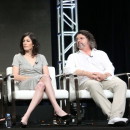 |
Question: For the producers, there are eight books, so assuming you keep getting renewed, are you going to do eight and out? Are you going to be like GAME OF THRONES, where if there isn't any more book material, you'll just go off and do your own OUTLANDER and maybe the TV show will be different from the books? Ronald D. Moore: I cannot imagine a scenario where we catch up with Diana Gabaldon. [Laughter.] So she will tell us what the end of the story is, I'm sure. Maril Davis: Yeah. But if Starz and Sony will have us, we will absolutely keep making the show. |
|
|
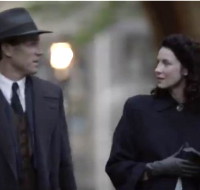 |
Question: For Tobias, in the first couple episodes we see a lot of Claire and Frank together, but we don't really see Frank on his own too much. Even if we didn't see that, did you have that kind of created for what his day-to-day life was like outside of being with Claire? Tobias Menzies: Yes, you always do that kind of background work to sort of build up the world that you're inhabiting. Obviously, a lot of that is done by the sets and the script that you have. But, yeah, I would do some work about his work life, which we don't see, and the colleagues. But, really, the heart of it is this relationship, and that was very brilliantly realized in the sequence of scenes that we got to play -- they kind of continue to sort of tear each other apart. |
|
|
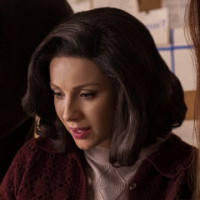 |
Question: For Sam, at this point, playing it for several years now, what is your favorite part of playing this character? What do you love about him? Why do you want to inhabit him every season? Sam Heughan: I think it's a very good question. I think we're very lucky. As we said, Diana Gabaldon has created this remarkable world. And I think what makes our show different to all the others is that it's constantly moving. It's constantly changing. It's not all set in one studio. And not only every season, but every episode is surprising and we go somewhere else. And I think this season in particular feels very strong. Each episode has its own individual sort of theme or feeling to it. And the characters, they grow up. They change. But, yeah, Jamie's a lot of fun to play. He is the other side of Claire, and they're a great team together. But I'm enjoying growing up with him over these last four years. And we'll see how much longer and how much further he can go. But, yeah, keep writing, Diana. |
|
Question: And the same for you, Caitriona. Caitriona Balfe: I think the great gift of doing a series like this is also that you're given time to really get to know your character, to really explore different elements. I mean, this season in particular, being able to create this woman over a certain period of time was really interesting, especially someone who, because of the loss of her love to Jamie, has shelved a certain side of herself. And how does that experience wear on somebody? How does that change how they interact with people in their lives, with everything? And I loved being able to play that. And then, going forward, when she gets reunited with her love, how you unravel all of that, and how do you break down the walls that somebody's built around their heart. That was a pretty unique thing to be able to play. I don't know that you get the chance to do that over an extended period of time in many projects -- it was just a really interesting exercise. Question: Can you talk about playing 20 years older than you actually are? Did you have to look at people who are 20 years older than you and go, "Now, how do people walk?" Caitriona Balfe: Yes. I'm going to say Claire's 20 years older than I actually am. [Laughter.] I think we all approach this from a place of how does experience and how does time change you. You know, in a certain way last year at the end of Season 2, I had to start doing a lot of that work. And some of it was I watched certain actresses. So I would watch an early film and then watch a later film and see how people don't change that much, but certain things change about them or how they carry themselves. And a lot of it is also that people, the older they get, a lot of the times there's just a certain gravitas or a certain authority that they gain through the fact that they're more comfortable with themselves or they know themselves better. And I thought for Claire especially, someone who's become a surgeon and all of that responsibility and getting to that place professionally, that that would add this kind of authority to her. And so that was one of the things that I wanted to play with, rather than, you know, crow's feet or a mono-brow. We thought about that, but we decided to go the other way. |
|
|
|
Check out the most recent trailer for OUTLANDER Season 3, which Starz released yesterday:
|
|
Read Q&A interviews from previous TCA press tours:
|
|
